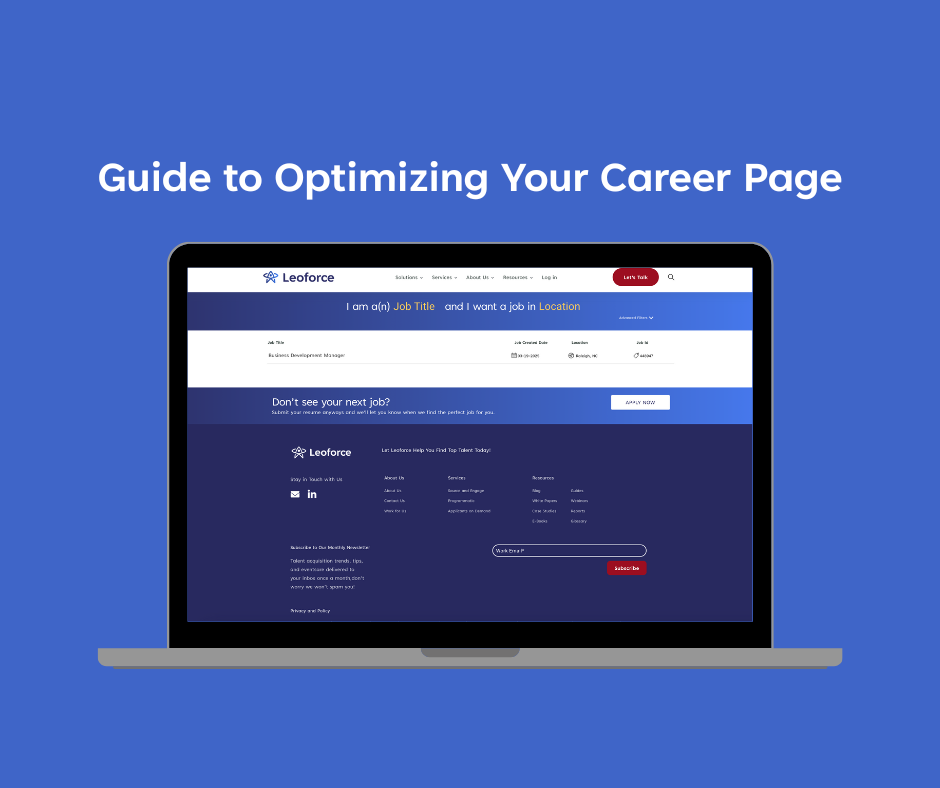Recruitment Skills Every Modern Recruiter Must Master

Imagine the responsibility of shaping an organization’s future by determining the quality of its most valuable asset: its employees. That is the onus recruiters face in trying to find the perfect candidate for each role.
Recruitment and talent acquisition are complex challenges that call for a well-rounded skill set that blends traditional expertise with digital competencies. In this article, we dive into 30 essential recruitment skills that modern recruiters must master to excel in their roles and ensure they attract and retain the best talents in their respective industries.
Interpersonal Communication
Effective communication is at the heart of key competencies of a recruiter. It encompasses both verbal and non-verbal communication. Recruiters must be able to articulate clearly, convey expectations succinctly, and listen actively. Non-verbal communication, such as maintaining eye contact and a positive demeanor, is crucial in building rapport with candidates.
Leveraging AI recruiting tools like the Leoforce Quantum feature enables recruiters and enterprises to elevate their communications through automation, showcasing advanced skills for recruiters.
Tip: Think before you speak; be brief yet specific and always have a positive attitude.
Confidence in Recruitment
Confidence in recruitment is about believing in your abilities, concrete knowledge, and preparation that fosters trust and professionalism throughout the recruitment process. For instance, consider a recruiter who specializes in the tech industry. By staying up-to-date with the latest software development trends and understanding the nuances of various programming languages, this recruiter confidently discusses roles with candidates, demonstrating a deep insight into what the job entails and what the hiring company values.
Tip: Stay informed about your industry to boost your good recruiter skills.
Curiosity and Learning
Curiosity and the continuous pursuit of learning empower recruiters to stay at the forefront of their industry. For instance, recruiters in the technology sector must keep abreast of new advancements and in-demand skill sets by networking, attending tech meetups, and engaging in online forums. That enables them to engage more meaningfully with tech professionals, ask insightful questions, and offer opportunities that match a candidate’s skills and career aspirations.
Tip: Allocate time every day to read industry-related news or attend relevant digital workshops.
Active Listening
Active listening is a communication skill that seeks to understand the meaning and intention behind a speaker’s choice of words, instead of simply interpreting the words themselves.
In the context of recruitment, active listening enables a deeper connection with a candidate by understanding what motivates them and what drives their priorities and preferences. It can help recruiters filter out candidates who are not the right fit for a particular role and zero in on the best available option. Recruiters who are active listeners will find it easier to identify candidates with specific skills, like leadership qualities or problem-solving abilities, for instance.
Tip: Keep an eye out for non-verbal cues. Make sure to listen without jumping to conclusions or engaging in value judgments.
Positive Body Language
Body language speaks volumes about our personality. When a recruiter first meets a candidate, demonstrating positive body language by maintaining eye contact, smiling genuinely, and leaning slightly forward can create a welcoming atmosphere. Such non-verbal communication signals to the candidate that the recruiter is engaged and interested in what they have to say.
Tip: Practice vocalizing in front of a mirror to convey positive body language.
Dependability
Dependability is the backbone of recruitment credibility. Consider a recruiter who has promised to update a candidate about their application status by the end of the week. The recruiter can build trust in their professional relationship by ensuring they call the candidate at the agreed time. This reliability is crucial, as it reflects the recruiter’s commitment and enhances the credibility of the recruitment process.
Tip: Always communicate timelines clearly and adhere to them.
Strategic Thinking
It involves envisioning the larger picture and understanding how each recruitment effort contributes to achieving organizational goals. Let’s say a recruiter is working to fill a position for a company looking to expand into new markets. By understanding the company’s long-term strategy, the recruiter can identify candidates with the potential for future leadership roles and international experience. Such foresight ensures the recruitment effort aligns with a company’s broader objectives.
Tip: Explore counterarguments and keep up to date with the latest news and trends.
Patience and Perseverance
Recruitment often involves delays and frustrations. Patience and perseverance are key to managing such moments without compromising the quality of hires. Recruiters must remain committed despite setbacks like candidates withdrawing at the last minute or clients changing their preferences.
Such eventualities can encourage the best recruiters to refine their search and explore untapped talent pools. Perseverance pays off when they finally connect with the perfect candidate who ticks every box.
Tip: Keep a positive outlook and focus on long-term outcomes without getting bogged down by disappointments.
Networking Mastery
A recruiter’s ability to network effectively is demonstrated through connections made at industry events and professional online forums. Attending industry conferences allows recruiters to stay in touch with professionals in their field, share insights, and expand mutual networks. This can lead to substantial payoffs in the form of referrals that lead to placing hard-to-fill roles.
Networking is crucial to hiring skills, enabling recruiters to identify and engage with potential candidates proactively. This illustrates the long-term value of building and nurturing a professional network in recruitment.
Tip: Attend industry events and participate in online forums to expand your network.
Empathy in Recruitment
Empathy in recruitment is vividly illustrated through a recruiter’s approach to a candidate who has been through several unsuccessful interviews. The recruiter can provide personalized advice on improving interview techniques and tailoring their resume more effectively by taking the time to understand the candidate’s frustrations and aspirations. The recruiter’s empathetic listening can help identify roles that align more closely with the candidate’s strengths and career goals and lead to a successful placement.
Tip: Ask for feedback from candidates to understand their experience and improve your approach.
Data Analytics in Recruitment
Imagine a scenario where a recruitment team leverages data analytics to optimize its sourcing strategy. By analyzing past recruitment campaigns, it identifies job boards and social media platforms that have consistently yielded high-quality candidates for specific roles.
Armed with this insight, the recruitment team adjusts its strategy to focus more on these high-performing channels and significantly improve the efficiency of its future recruitment efforts. By monitoring metrics such as time-to-hire and candidate engagement rates, recruiters can continuously refine their approach and ensure they attract and engage the best talent effectively.
Tip: Familiarize yourself with data analysis tools and metrics relevant to recruitment.
Marketing and Sales Acumen
Attracting top talent requires selling both the role and the company. This involves crafting compelling job descriptions, utilizing social media effectively, and engaging candidates with the company’s culture and values. These tasks highlight the skills needed for recruiting that go beyond traditional recruitment methods, requiring a blend of marketing and sales acumen.
Tip: Develop a strong employer brand that aligns with your target candidates’ values.
Technological Proficiency
The strategic use of recruitment technologies and social media platforms is vital for streamlining the hiring process and broadening your candidate search.
Tip: Stay updated on the latest recruitment technologies and their potential impact on your processes.
Critical and Analytical Thinking
Evaluating candidates goes beyond resumes and interviews. It involves assessing cultural fit, growth potential, and how they align with the company’s future. This skill is crucial for identifying hard skills for recruiters that candidates must possess to succeed in the roles they are applying for.
Tip: Implement structured interviews and assessment tools to evaluate candidates more holistically.
Time Management and Multitasking
Balancing multiple roles and responsibilities requires effective time management and multitasking without compromising quality.
Tip: Prioritize tasks based on urgency and importance and utilize tools to keep organized.
Expectation Management
Aligning candidate and employer expectations is crucial for successful hires. This involves clear communication about roles, responsibilities, and career progression opportunities.
Tip: Facilitate open discussions between candidates and hiring managers to ensure alignment.
Continuous Learning
The recruitment field is constantly changing. Continuous learning ensures recruiters stay informed about best practices, legal changes, and new technologies.
Tip: Engage in professional development opportunities and seek mentorship within the industry.
Event Networking
Maximizing opportunities at recruitment events and career fairs can lead to valuable connections and insights.
Tip: Prepare effectively for events by researching attendees and setting goals for new connections.
Negotiation Skills
Skilled negotiation is key to securing win-win outcomes for both candidates and employers by facilitating a deep understanding of each party’s needs and priorities.
Tip: Enhance your negotiation abilities through empathy and active listening.
Adaptability and Flexibility
The capacity to swiftly adapt strategies and approaches in line with shifting market dynamics, candidate expectations, and organizational needs is indispensable. This adaptability is among the core skills of a recruiter, embodying the agility required to excel in talent acquisition in a constantly changing job market.
Tip: Cultivate a mindset that embraces change and seeks innovative solutions.
Cultural Competence
Recognizing and valuing diversity is essential for fostering an inclusive recruitment environment. It involves appreciating diverse perspectives and cultural backgrounds and minimizing unconscious bias by ensuring recruitment practices are equitable.
Tip: Implement unbiased recruitment practices and strive to understand different cultural perspectives.
Digital Literacy
Beyond basic technological proficiency, digital literacy involves leveraging advanced tools and platforms to streamline recruitment processes. Leoforce’s recruiting software is adept at identifying candidates who are not just qualified but are also a great match for the role and company culture. It radically enhances the likelihood of their success in the position.
Tip: Explore AI-powered tools and advanced applicant tracking systems to enhance efficiency.
Employer Branding
Effectively articulating the employer’s brand and value proposition is key to attracting potential candidates. This competency is crucial for showcasing a company’s culture, mission, and what it stands for. It directly influences the attraction of compatible candidates.
Tip: Collaborate with marketing to ensure consistent and appealing employer branding.
Project Management
The complex nature of recruitment – often entailing simultaneous management of multiple job openings, candidate pipelines, and timelines – necessitates robust project management skills. These include the ability to organize, prioritize, and execute recruitment campaigns efficiently.
Tip: Utilize project management tools to track recruitment activities and deadlines.
Psychological Insights
Harnessing psychology by way of assessing personality traits, evaluating lateral thinking skills, and testing cognitive functions like memory and creativity, can unlock a deeper understanding of candidate behaviors and motivations. Psychological insights derived from such exercises can significantly improve placement success. Recruiters with the ability to discern these nuances demonstrate advanced recruitment skills for resume consideration.
Tip: Use behavioral interview questions to glean insights into candidates’ personalities and motivations, enhancing your skills for recruiter effectiveness.
Strategic Sourcing
Finding talent requires creativity and the ability to look beyond conventional sources. This requires recruiters to have a keen eye for untapped talent pools, utilizing technical recruitment skills to explore niche job boards, professional groups, and social media channels. It’s a testament to a recruiter’s ability to find and attract the best talent, showcasing top recruiter skills.
Tip: Explore niche job boards, professional groups, and social media channels to discover untapped talent pools.
Candidate Nurturing
Candidate nurturing reflects a recruiter’s ability to maintain and engage a talent pipeline, ensuring a reservoir of qualified candidates for future openings. This strategy is integral to recruiter skills and competencies, focusing on long-term relationship building with potential candidates. It is a critical skill for recruiter to keep candidates engaged and informed about the organization and potential opportunities.
Tip: Implement candidate engagement strategies that keep potential candidates informed and interested in the organization.
Compliance and Ethical Recruiting
Understanding and adhering to labor laws and ethical standards is crucial for protecting an organization and ensuring fair treatment of candidates.
Tip: Stay informed about changes in recruitment laws and best practices in ethical recruiting.
Feedback Analysis and Action
Actively seeking and analyzing feedback from candidates and hiring managers can significantly improve recruitment processes.
Tip: Implement a systematic feedback collection process and use the insights to improve continuously.
Enhancing Recruitment through Skills Assessments
Using assessment tools helps identify candidates who best fit the role and the organization. Skills assessments are a tangible manifestation of 10 skills of a recruiter, enhancing the recruitment process’s effectiveness and efficiency.
Tip: Integrate skills assessments into the recruitment process to evaluate candidates more effectively.
Conclusion
Mastering these HR recruiter skills is essential for modern recruiters seeking to successfully navigate the complexities of today’s job market. By continually developing these competencies, including technical recruitment skills and IT recruitment skills, recruiters can enhance their career growth and contribute significantly to the strategic goals of their organizations. Recruiters are encouraged to embrace continuous learning, leverage technology, and foster inclusivity to retain talent.
Transform your recruitment and talent acquisition strategies with Leoforce by Leoforce. Our cutting-edge AI recruiting solution is designed to match you with the highest quality talent, tailored to fit any business size, industry, or hiring need—regardless of budget constraints.
Leoforce provides robust solutions for businesses and staffing agencies alongside flexible on-demand options for seasonal hiring demands.
Schedule a demo today and take the first step toward recruitment excellence!





